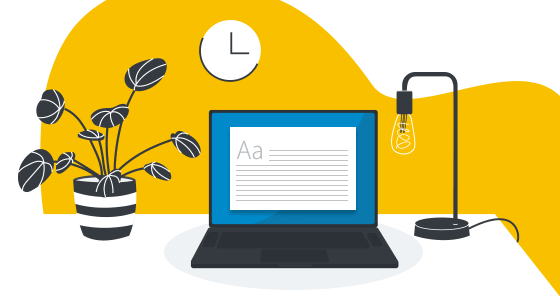
This article was last updated on 20/07/2023
This question is commonly asked about pensions. How much should we save for our golden years when retire? And there isn’t a simple answer. It depends on several variables and is incredibly personal. Each of us will want a different lifestyle and will need different sized pots to match the requirements of our later years.
But one thing is certain, the State Pension is NOT enough. Without any private or workplace pension savings you’ll be living in relative poverty, even if you qualify for the full State Pension of £203.85 per week (2023/24), which you can receive from the age of 66 (increasing to 67 by 2028). Having your own private pension is a necessary savings pot for the future you, to spend when you no longer want to rely on a working income.
As part of my research into the question - How much is enough? - I’ve spoken to seven people at different stages of the savings journey to understand their thoughts and feelings on the debate. They’re aged from 20s through to 70s, and it’s fascinating to understand their views which demonstrate exactly how personal the subject is.
The maths of calculating how much is enough
PensionBee has a great calculator that can help you set your pension goal. Think about the following questions and input your answers to work out how much is enough. Just use the very simple sliders to select your answers and see what number pops out.
- The age that you want to retire
The earlier you stop working the more money you are going to need. And the younger you start saving the bigger your pot is likely to be by retirement.
- The income you want/need at retirement
A realistic estimate for your retirement goal is often suggested to be around two thirds of what you earn now.
- Pension Level and contributions
Add in your current pension pot size, your proposed contributions and your employer’s contributions, if you’re enrolled in a workplace pension scheme.
Using myself as an example
I’m 44 and would like to retire by the age of 60. I would like a private pension income of £20,000 per year. This is based on just me and having no mortgage by then.
I have a current pension pot of £70,000 and intend to put in £1,000 per month until retirement age. There won’t be any one-off contributions or employer contributions as I’m self-employed. My projected annual income, including the State Pension (you can switch this on or off) will be £24,440. More than I need, perfect.
Taking it a step further, there are some great analytical tools once I log into my PensionBee account that help me to calculate a target savings amount. This number is £380,000 and with my current assumptions this will be enough to get me through to the age of 95 (the death age used in the calculator assumption). The age of retirement has a big impact on these numbers: if I make my age 65 rather than 60, my required pot size reduces to £307,000.
Have a go and try it yourself!
Back to my case studies of different generations
Age 20s

Jordon Cox is the founder of the Jordon Cox website.
- What are his pension thoughts and what is his target?
Honestly, I don’t have a target. I’ve only started thinking about pensions in the last year, so it’s all still very new. I think my main target before properly looking into pensions, is to get on the property ladder, and have that help with retirement in later life.
One thing that people of my generation have to think about, is net assets when they get to retirement age. As it’s much harder to get onto the property ladder and have assets behind you to help with retiring, we may need to think about putting more into that.
Age 30s

Nicola is the founder of the Frugal Cottage website and is a teacher and advocate of FIRE (Financial Independence, Retire Early).
- How much is enough?
This can be a tricky one to answer - the fear of not quite having enough is very real! Plus working for one more year can be a tempting thought when facing retirement. But realistically, it depends on what you want to do in your retirement. If you want to be travelling to exotic places and spending a fortune every year, then you’ll obviously need more. If you want a more simple, quieter lifestyle then your pot will stretch a lot further. My husband and I are aiming for a simple retirement so our needs will be much less.
- What’s your target for a retirement pot?
Our target is slightly different! We’re aiming for FIRE - retiring early and creating our own financial freedom along the way. So, our target for this is to reach £18,000 a year in dividend income and capital growth, by the age of 50. If just using cash numbers alone, we need to save around £306,000 by then. This will bridge the gap between retiring early and then our teacher workplace pensions and State Pensions kicking in at 67. Then we’ll have more income streams than just the investments alone.
Age 40s

Martin Bamford is a Small Business Owner and Founder of Bear Content.
- How much is enough?
The ‘right’ amount to save for retirement will vary depending on age, income needs and investment risk appetite. It’s seriously hard to settle on a figure that’s enough, as society has conditioned us to always want more. Regardless of the numbers involved, it makes real sense to build financial provision for the future, because we never know when circumstances might change and force us into an earlier than planned retirement.
- What’s your target for a retirement pot?
I’m 41 and my Financial Plan shows me I need a pension and investment pot of £1.3m for my family to achieve financial freedom and retirement. As a limited company owner, I tend to max out my pension contributions each year with employer contributions, as well as making regular ISA contributions. My main wealth-building strategy is growing the value of my businesses, either for eventual sale or to continue producing dividends while being managed by others. I’m a big believer in diversifying income streams, as those clients I’ve worked with who have the most successful retirement plans do not rely on one source of income in later life, but enjoy a mix of pension, investment, rental and business income.
Pete is the founder of the Meaningful Money Podcast and website.
- How much is enough?
The question of how much is enough is unique to each individual. Ultimately, it comes down to money in versus money out. If you have more going out than coming in - as is the case for most of us in retirement - you’ll need to make up the difference by drawing off capital. ‘Enough’, then, means having an amount that you can draw from to fill that gap indefinitely
- What’s your target for a retirement pot?
My personal goal for pensions and investments - combined between my wife and I - is about £750,000. The useful (but not gospel) 4% rule, allows for about £30,000 per year to be withdrawn, on top of State Pensions. It’s my goal to retire at 60 though, so there’ll be seven years after that before my State Pension kicks in. I call this the Danger Zone because these early years are when portfolios get most ravaged. The combination of free time, good health and accessible wealth means that this is when the most amount of money gets spent, and if it isn’t managed carefully this can do irreparable damage to a portfolio.
Age 50s

Faith Archer is a fellow PensionBee ambassador and is the founder of website Much More with Less.
- How much is enough?
How much you need to retire depends on how much you want to spend. I don’t fancy shivering in a corner, eating baked beans, but I’m not aiming for back-to-back cruises and champagne either. Currently, I don’t think our living costs will change much. We might save a bit when the kids leave home, and hopefully spend a bit more on travel, but we’re lucky enough to have cleared our mortgage already.
- What’s your target for a retirement pot?
One of my targets this year is to come up with a target for my retirement pot! The traditional maths for Financial independence, Retire Early (FIRE) reckons you need to put away 25 times your annual living expenses to avoid running out of money (as suggested by Pete Matthew and his 4% statement). For example, for £20,000 a year you’d need £500,000 and for £40,000 you’d need a cool million.
It sounds simple, but actually our income will come from different directions at different times: a buy-to-let, work pensions kicking in at different ages and then our State Pensions. We also have money in ISAs that could potentially tide us over before some of the pensions start.
Now I’ve turned 50, I’d like to work out exactly when my husband and I can afford to retire. On my side, I’ve got just shy of £250,000 in my pension pots, and if I make National Insurance Contributions for another six years (you need 35 years of full National Insurance Contributions to qualify for the full State Pension) I should get the full State Pension from the age of 67.
I’m comfortable we have enough to retire at State Pension age, it’s just about working out how much earlier we could quit. I need to grapple with some cashflow modelling!
Age 60s

Nick is 65 and is a semi-retired freelance writer. He is the Founder of Website Pounds and Sense.
- How much is enough?
In general terms, I think ‘enough’ means having sufficient funds to cover your basic outgoings, a few luxuries such as holidays and meals out, and a bit left over for ‘contingencies’. What that will amount to in practice depends on the individual. If you want me to give you a ballpark figure, I’d say that in my case £1,500 a month should cover it. But I have fairly modest tastes and no dependants. Obviously if that wasn’t the case, the amount would be more.
- What’s your target for a retirement pot?
Currently I’m semi-retired and living partly off my private pension. I’m just six months from receiving the State Pension, so I’m not really trying to build my pension pot now. I have a pot of around £170,000 in total. Of that, £50,000 is in my SIPP (personal pension) and the rest is in ISAs and other investments. I have a personal financial adviser who assists me with some of my investments and he’s told me I will have more than enough to fund my retirement once my full State Pension kicks in on my 66th birthday.
Age 70s

Gill is now retired and lives with her husband by the sea.
- How did you plan for your retirement?
We didn’t start with a specific pension fund target. In 1972 we started an insurance broking business which became our main source of income and ultimately capital growth. Residential and Commercial property investment became an adjacent interest in 1988 and progressed until 2003 when we completed the building of our current home. Over the years payments were made into pension funds although the payments were relatively low compared to the property investments. In 2001 we sold the insurance brokerage.
We retired in 2003 (in our 50s) and in the years that followed some properties were sold, the money going into a balanced investment of ISAs, pensions and Premium Bonds. We retained one residential property which still provides us with a regular income.
I think that our way might not work as well now as property has become so expensive to use as a “pension pot” but luckily it worked well for us. Early investment into a pension is much more important in today’s financial climate.
Ultimately, everyone’s situation is different
These stories demonstrate perfectly how retirement planning has changed so dramatically over the past 40/50 years. In a perfect world, as Martin suggested and as Gill has done, a saver would have a balanced portfolio of property, pension and investments. But this isn’t as possible for future generations or even for someone like Jordon just starting on his financial journey.
There’s also huge variety in everyone’s personal situations with each case study having very different plans for their retirement in terms of financial requirements. This serves to highlight the importance of understanding your goals and knowing what you should be aiming for with your pension pot. I know I feel reassured knowing my pension savings goals and that I’m currently on track to hit them.
Risk warning
As always with investments, your capital is at risk. The value of your investment can go down as well as up, and you may get back less than you invest. This information should not be regarded as financial advice.
Lynn Beattie is a PensionBee customer and CEO/Founder of Mrs Mummypenny, a personal finance website. She is also an ACMA management Accountant, previously working in commercial finance for Tesco, EE & HSBC. Lynn is a single mum to three boys, living in Hertfordshire, and is the author of ‘The Money Guide to Transform Your Life‘ published in September 2020.




